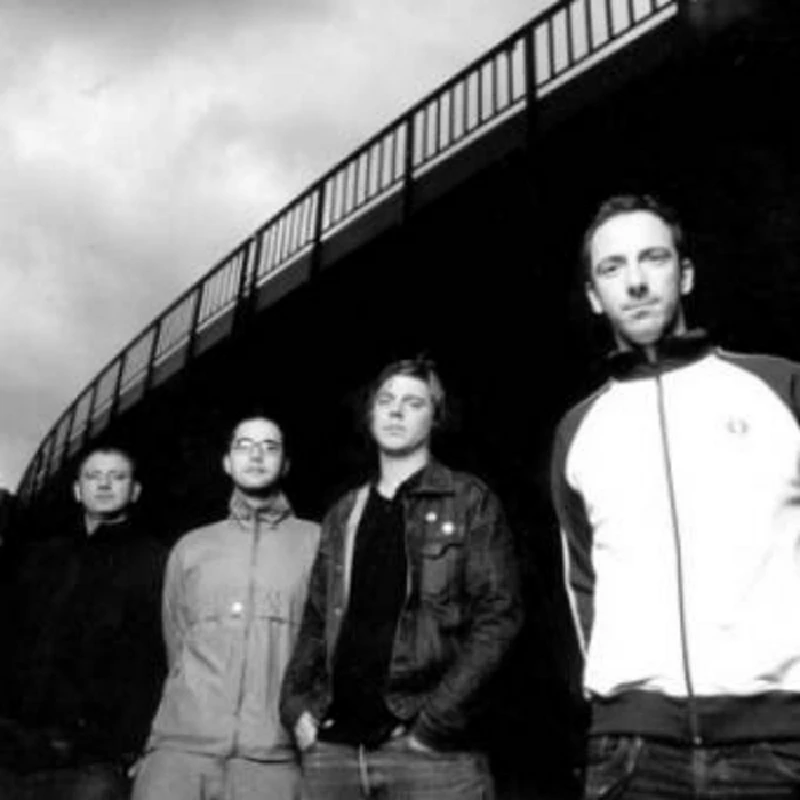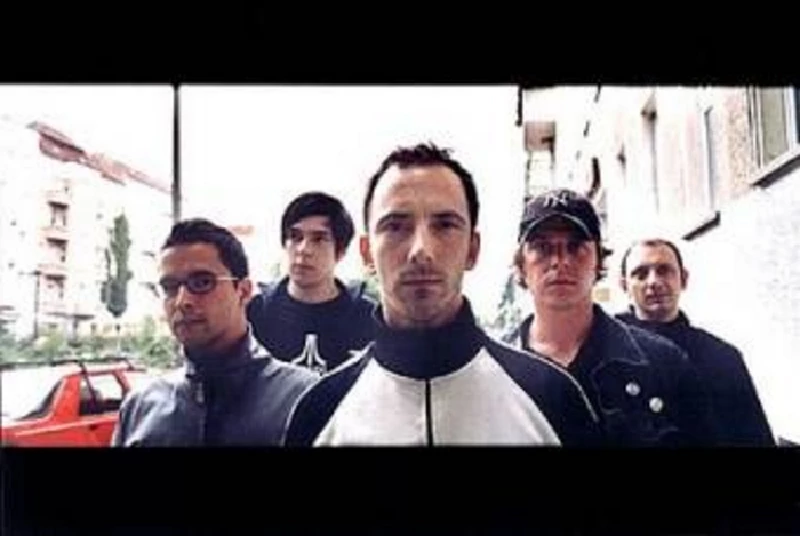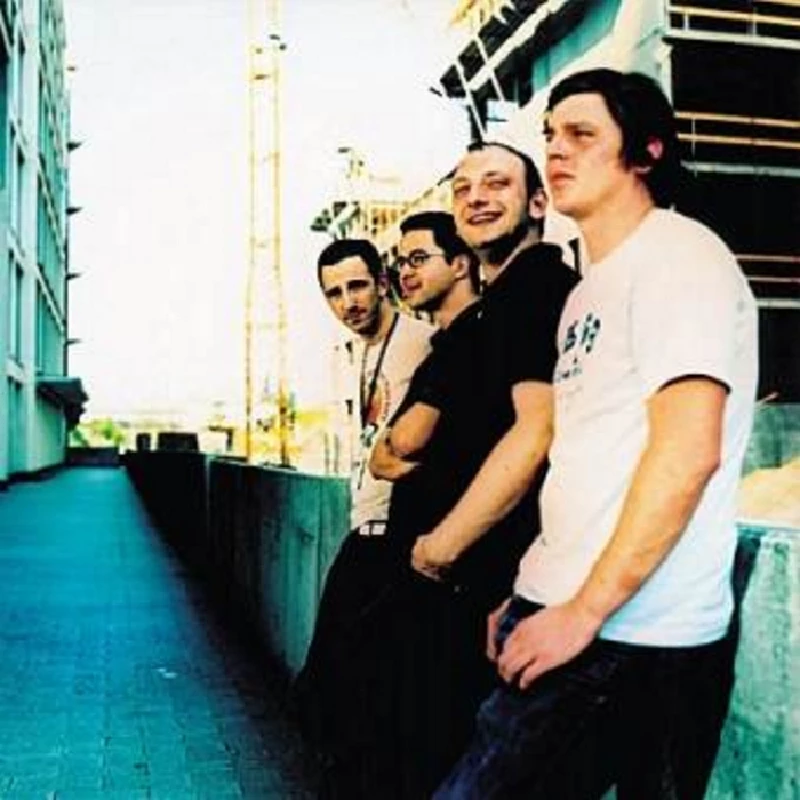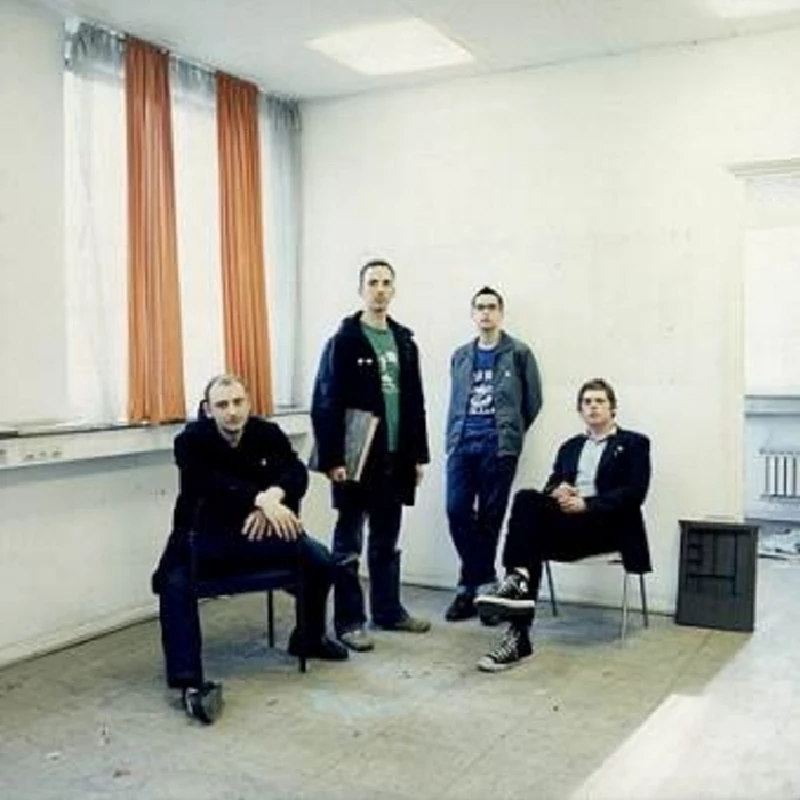Pale - Interview
by Mark Rowland
published: 18 / 4 / 2003

intro
Rising German band Pale have recently expanded their punk-pop/emo sound with electronic instruments, horn and pianos. Mark Rowland talks to members Christian Dang-Anh and Stephan Kochs about their new album 'How to Survive Chance'
I'm waiting outside the backdoors of the Highbury Garage, and I'm so hungover. I got incredibly stupidly wasted the night before, which is not clever in the slightest, especially when you've got to travel to London the next day and especially if you're making that long (for me) trip to London to interview a band. Not clever at all. The band in question is Pale, a German band who, with new album 'How To Survive Chance', have expanded their punk-pop/emo sound with electronic flourishes, horn parts and lots of underlying piano, giving their music a greater sense of variation, and a distinctive sound that takes semi-retro sounds and splices them to modern pop-rock. The result is a sound comprising of different elements of musical styles from the last four decades (though less is taken from the 80's, Thank God). The band, vocalist/guitarist Holger Kochs, drummer Stephan Kochs, guitarist Christian Dang-Anh and bass player Hilly, seem in high spirits as I'm escorted upstairs at the Garage. The band are in the middle of their sound check, which sounds pretty good, as far as I can tell, as I'm quite busy concentrating on feeling like I've never touched a drop of alcohol in my life, or at least, trying to give myself the impression that that's how I'm feeling. After playing versions of 'Goodbye Trouble' and 'Sometimes Somewhere', two of the best songs from their new album, the band finish their sound check. Their tour manager beckons me to follow him into the backstage area, and I force my body to comply. Due to a mix up, there are two interviews for the band to do and only one written on their schedule, so the band do both interviews at the same time, with Holger and Hilly going off to do the other interview,and Christian and Stephan doing the interview with me. Both are in very good moods. Stephan is pretty loud, talking a lot and making jokes, while the more softly spoken Christian is a lot more laid back, and sits smiling and puffing on a cigarette. I'm really hoping I'm not going be sick. PB : For the people who've just discovered your band, how did you form? CD : From the start? PB: Yeah, the start's always a good place to begin. CD : Well, the band has been around for, what, ten years now? SK : Yeah, in September CD : We met in September '93, with a different bass player at the time, and played a few shows and recorded two records. SK : Yeah, the first one was an EP, so two and a half records! No hold on, one and a half records! CD : And on the tenth of January '96, Hilly joined us, and recorded one, two, three.four records, right? SK : Yeah that's right. CD : And then we played lots of shows. SK : Too many shows! CD : (laughs) Too many, yeah, then we had three of our videos played on MTV Germany, met quite a lot of people, played with a lot of bands, like Jimmyeatworld, Ash and Elliot. SK : Quite a lot of American bands. PB : That pretty much summed it up. Your sound has evolved quite a lot over the years, especially on your new album 'How to Survive Chance'. Did that sound just develop naturally, or did you all sit down and go "This record is going sound like this."? SK : It was difficult, the last record, because we didn't have any time to practice regularly, over 2000 and 2001, as we were constantly touring. In 2000 we did about 100 shows and in 2001 we played 110, so it was like our full time job, and we lost our rehearsal space, and so we decided "Let's do a record, let's put some orchestral things in it", and there was no way to imagine how it would sound. It was a case of going into the studio and rehearsing at night, and putting down the basics in the morning, and writing the rest of the parts around the basics. It was like: "Can we use some horns? Yeah it sounds good or no it doesn't sound good, so we'll try something else.' So, it's not like we try to fix exactly what we're doing before we go into the studio or before we try to write the songs. CD : The last record was a special case, because, usually as Stephan says, we come together and practice new songs, and say whether a song is a good song or not a good song, but 'Razzamatazz', the album before the new one, was quite a step for us, as a lot more people discovered our music, and then when we wrote the new songs for this album, we knew in our minds that we didn't want to repeat ourselves. It would've been much easier to write songs like the ones on 'Razzamatazz', but we wanted to, I don't know whether it's an evolution or a step forward in the sense of writing songs, we just wanted to write differently. SK : I think it was more of a step forward, because for me, the songs seem more compact, more essential in songwriting, less 'do a break here and a break there', more of a pop way of thinking, with songs around three minutes with a good chorus, which people remember. We tried to make every song snappy and memorable, and obviously as they're more compact, they're easier for us to play! PB : Songs like 'Drop that Beat' on the new album are pretty tongue-in-cheek lyrically. How important are lyrics to your music? CD : Actually, you're talking to the wrong people! He writes the lyrics (pointing to Vocalist/guitarist Holger), but most of the time it's personal stuff. And with that track, track number ten, that was originally supposed to be a duet, and it is tongue in cheek, kind of a tribute to the old swing music. Is that what it's called, swing? SK : Yeah, like Sinatra and all that. Most of the things that Holger tries to express in his lyrics are like a secret to us, we don't know the lyrics until we type them out for the record sleeve and check them for errors. CD : And when he's singing it no-one can understand him. SK :Yeah! (laughs) We don't really get an idea of the lyrics when he's doing lyrics until he's doing interviews. Someone will ask about the lyrics and he'll say "Yeah, that's about the time when I was in Spain and I really missed my friends" and we're like 'um.yeah.' PB : Are lyrics kind of an afterthought to your music, or do you start with lyrics and work a song up around them? CD : It's more like the other way round. We write the music to a song and record it one day, and say "Tomorrow we'll record the vocals", so Holger goes off and comes up with some lyrics to the song. It's always like last minute lyrics. PB : The press have kind of tagged you as an Emo band. Do you mind your music being lumped into that genre, and was your change in sound kind of a way to escape that label? CD :It's a frequently asked question, so we know the answer to this by heart! It's a way of understanding the music. To us, Emo generally means music that's emotional, and in that sense it's fine to be called Emo, but it's only a way to address people, to give them a vague understanding of your music. One person gets the Emo thing. Another person might like the pop sensibilities in the music. For us if it's restricted to just that term to describe our music, it would not be good for us, as our music has more to offer than that. There may be some Emo elements in it, but there's more to it from our point of view. We get people who come to us who have related to the pop side of our music or the straight rock side of our music, and that's better, to relate to people in different ways. PB : I interviewed Jonah Matranga of Onelinedrawing fame, and he said that he thought that Emo was a redundant term as all music tries to connect with people emotionally. Do you agree with that? CD : Yes, definitely. Emo should describe the levels of emotion in a piece of music rather than be a description of a set sound. PB : Earlier you mentioned a few of the high profile acts you've toured with. Did you find that the fans of those bands became fans of your music? SK :It depends on the band, really. I don't know what fans of Ash are like in Britain, but in Germany it's like a teeny thing. PB :(Nods) Yep. SK :(Laughs) And the show with them was Jimmyeatworld, us and Ash, and most of the people were there because of Ash, not because of Jimmyeatworld, and totally not because of us, and so there were about 800 people, and they opened the doors, and there was 150 well, children in my eyes, running to the stage and clapping their hands and going like "Aaah! Aaaah!", so it was really disappointing, I felt this kind of fear in me, like we thought they were gonna throw things at us! CD : And they did. They threw roses! Accidentally, I guess. SK : Yeah, it turned out to be a really good night for us, because Ash didn't have any merchandise with them, don't ask me why, and at the time Jimmyeatworld weren't allowed to sell their records because of they'd just changed labels, so they just had T-shirts, and we had all the stuff from the label with us. So the kids were like, "I have to buy something! This'll do!"so we made a lot of money from the evening, and people liked us, which is always good. I think there's a real similarity in the fans of Jimmyeatworld and the fans of our music, so it's not a problem playing with Jimmyeatworld in Germany, but with Ash, it's different. It's really strange, you play songs which normally people don't like, and they jump up and down, just because they're at a concert. It gives you a good feeling that it's not because of you or your music, it's just because people want to see headliners and they see you as a warm up, but it's always fun. PB : If you had to choose between playing a big show or an intimate venue, which one would you go for? CD : Depends on what you mean by a big show, because 'intimate venue' that's got the answer within it. Playing smaller club shows and places like that always has something that can't be found anywhere else. PB : Right, a token muso question: Can you name one artist or band that from the moment you heard them made you think "That is what I want to do with my life"? SK :There are I think three bands in my life that have influenced me. The first one is Husker Du. They were one of the first guitar/ punk rock bands I heard in my life, and their energy, the music they made and their different styles, like the first records were totally punk rock. 'Warehouse: Songs and Stories' is more like pop stuff, punk-pop stuff that is very influential, but not really praised like it should be. Like when people talk about guitar driven pop music, and they always mention R.E.M., or the band with Kim Deal in it, PB : The Pixies. SK : Yeah, the Pixies, but Husker Du influenced them all, so I think they should be worshipped for everything we do nowadays. The other bands are the Beatles, for sure, because its perfect song-writing, and they did a lot of things first, like the first movie clip, the first everything, you know, the first eight track recording, and my last band is the Who. I saw that concert in New York thing, where they played in front of that fireman, and I don't know how old they are now, but Pete Townsend played like he was still and 18 year old kid, he didn't play perfectly. He just had fun onstage. It was just amazing. It wasn't like the Rolling Stones, who are just like old farts on stage, like imitating themselves, nothing else. CD : Right now it's really hard for me to think of some band that I really admire. I can think of bands that I used to admire, but I can't really think of any that have really influenced me, but right now it's like certain songs touch me in some way and other songs just don't so I couldn't say a certain band that I really aspire to musically. I don't know. SK : You usually have bands that are really important to you when you are a teenager, when you totally worship a band. These days I'll like four or five songs on an album and the rest is like "yuck". I'll buy that record for those few tracks, but not for the rest of it. CD : I'm not sure if it's really the reason but the older I get the less bands I like. SK : Yeah, that's pretty much the way it goes. PB :That's weird, I was thought that as you get older, your musical tastes diversify a bit more. I don't know. I'm not old enough yet I don't think. (Pause) Sorry if I'm a bit slow today, I'm pretty hung over. CD : What did you do? PB : I just went to this party and it was a bit crap, so I drank a lot. CD : What did you have? PB : Well, at one point I had about six double Southern Comforts within the space of a few minutes. Not clever. SK : We wanted to do what you did last night. CD : Yeah. SK : Though, unfortunately, we didn't have time to do it. PB- Well, I didn't exactly have fun, believe me. CD : (Laughs) Don't worry about it. PB : Thank you for letting me be myself.
Picture Gallery:-



most viewed articles
current edition
Peter Doherty - Blackheath Halls, Blackheath and Palace Halls, Watford, 18/3/2025 and 21/3/2025Armory Show - Interview with Richard Jobson
Liz Mitchell - Interview
Deb Googe and Cara Tivey - Interview
Lauren Mayberry - Photoscapes
Max Bianco and the BlueHearts - Troubadour, London, 29/3/2025
Garfunkel and Garfunkel Jr. - Interview
Maarten Schiethart - Vinyl Stories
Clive Langer - Interview
Sukie Smith - Interview
previous editions
Heavenly - P.U.N.K. Girl EPBoomtown Rats - Ten Songs That Made Me Love....
Trudie Myerscough-Harris - Interview
Doris Brendel - Interview
Beautiful South - Ten Songs That Made Me Love...
Dwina Gibb - Interview
Kay Russell - Interview with Kay Russell
Pulp - Ten Songs That Made Me Love...
Barrie Barlow - Interview
Sound - Interview with Bi Marshall Part 1
most viewed reviews
current edition
Davey Woodward - Mumbo in the JumboNigel Stonier - Wolf Notes
Wings - Venus and Mars
Kate Daisy Grant and Nick Pynn - Songs For The Trees
Only Child - Holy Ghosts
Neil Campbell - The Turnaround
Philip Jeays - Victoria
Darkness - Dreams On Toast
Suzanne Vega - Flying With Angels
Charles Ellsworth - Cosmic Cannon Fodder
Pennyblackmusic Regular Contributors
Adrian Janes
Amanda J. Window
Andrew Twambley
Anthony Dhanendran
Benjamin Howarth
Cila Warncke
Daniel Cressey
Darren Aston
Dastardly
Dave Goodwin
Denzil Watson
Dominic B. Simpson
Eoghan Lyng
Fiona Hutchings
Harry Sherriff
Helen Tipping
Jamie Rowland
John Clarkson
Julie Cruickshank
Kimberly Bright
Lisa Torem
Maarten Schiethart